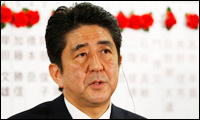‘Abenomics’ unnerves Korean exporters
Korean companies are expected to experience another hurdle in their exports as Shinzo Abe’s expected return to power in Japan is highly likely to appreciate the Korean won against the Japanese yen.
Conservative ex-premier Abe has pledged to ease credit in an unlimited manner to boost the Japanese economy, which will weaken the value of the yen and thus hurt Korean firms’ competitive edge over Japanese firms. Japan’s Liberal Democratic Party (LDP) led by Abe won the general election on Sunday by a landslide.
In anticipation of his stimulative economic policy, or Abenomics, the Japanese yen dropped to a 20-month low of 84.48 against the U.S. dollar during Monday’s trading session and Japan’s benchmark Nikkei jumped around 1 percent Tuesday.
Abe is expected to bolster quantitative easing to tackle the stronger yen, as he earlier pledged to allow an annual inflation rate of 2 percent, far outpacing the 1 percent targeted by the Bank of Japan.
The initiatives by Abenomics now unnerve Korean exporters which have already faced difficulties because a stronger won is hurting their competitiveness.
The prime minister-in-waiting has vowed to take steps to boost an economy now in its fourth recession since 2000 by fighting the twin curses of a high yen and persistent deflation.
To that end, he wants the Bank of Japan (BOJ) to set an inflation target of 2 percent, up from the current goal of 1 percent, and also to undertake “unlimited” monetary easing.
Many market insiders here think that his plans will accelerate the current trend of a stronger won against the yen, consequently translating into a drop of profits among exporters. The value of 100 yen against the won has already continued to drop to end at 1,276.84 on Tuesday, which stood around 1,400 won at the end of September.
The Korea Automotive Research Institute estimated that a 10 percent drop in the value of yen against the won will decrease sales of local automakers by 12 percent.
Many exporting firms have shared the sense of crisis amid a strong won.
According to a recent survey of 789 Korean exporters by the Korea International Trade Association, about 40 percent of respondents said the weakened yen will hurt their competitiveness.
Economists also said the yen will keep weakening, which could have a negative impact on the Korean economy.
“BOJ monetary policy poses a risk,” Tim Condon, ING senior economist, said. “LDP wants the Bank of Japan policy to be much more accommodative. A significant yen depreciation could shift sentiments and portfolio flows sufficiently to offset won appreciation pressure.”
But economists also noted that the impact on Korean exporters by a weakened yen has been exaggerated, arguing that local firms are now strong enough to compete with Japanese firms.
“Yes, the yen will be depreciated for a while,” Jung Ho-sung, researcher at the Samsung Economic Research Institute, said. “But that doesn’t mean all Korean firms will suffer a drastic drop in profits. Japanese firms may be able to obtain a bit of price competitiveness but Korean firms have long upgraded product quality while their Japanese rivals have been in a slump.”
He also said he is skeptical that Abe will deliver all his election pledges after the victory.
“He seems to have come up with too many radical pledges to win the election. I don’t think he can keep all of them. Especially, his initiatives are not likely to go down well with the BOJ,” he said. <The Korea Times/Kim Tae-jong>


























































